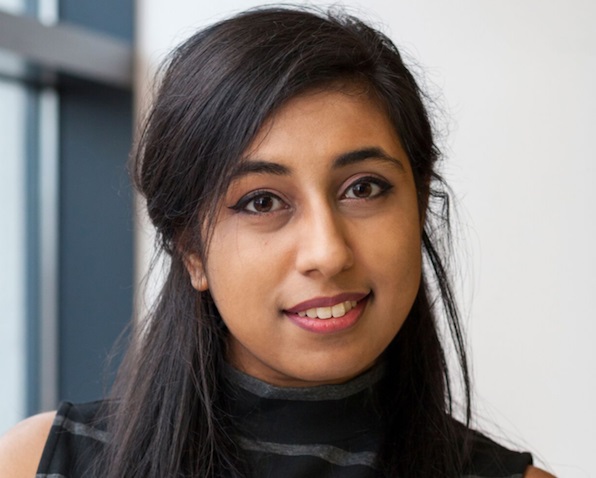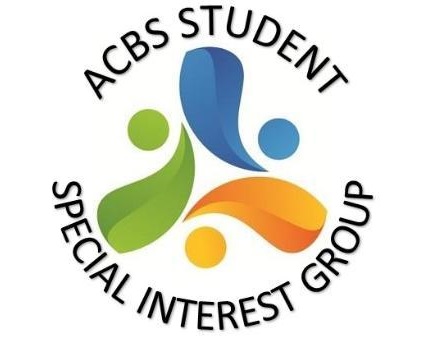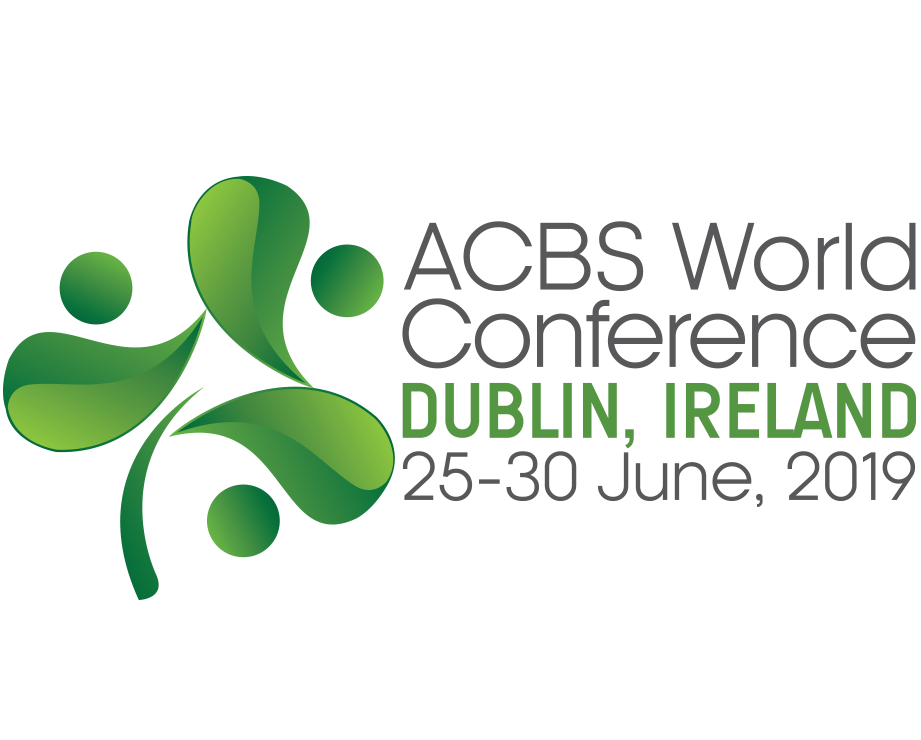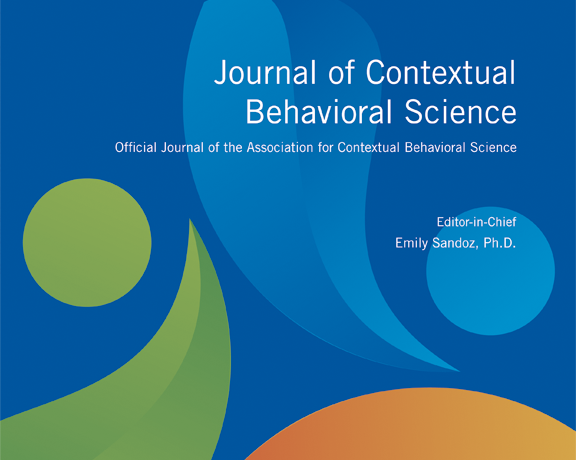2019 Student SIG Newsletter
2019 Student SIG Newsletter|
Student Newsletter - Summer 2019 |
|||
Greetings from the Student SIG
Welcome to the ACBS Student Newsletter! With over 1,700 ACBS student members worldwide, we are showcasing what the ACBS Student Special Interest Group (SIG) has to offer and to highlight some of the interesting things that students are doing. There are many ways that students can participate in ACBS, such as watching Student SIG Webinars and applying for scholarships to the World Conference. We are excited to announce the new Student Representative to the ACBS Board of Directors, Varsha Eswara Murthy. Thank you to Sonia Singh for serving as the Student Representative and to Maureen Satyshur for serving as the Student SIG Co-Chair for the past year, you will be missed! The Student SIG will be electing a new Co-Chair soon, so stay tuned for the co-chair elections this summer. We hope you enjoy reading the Student Newsletter! |
|||
Interview with ACBS member Amanda Muñoz-MartínezWe love to learn about what the ACBS student members are doing. For our Summer 2019 student newsletter, we interviewed Amanda Muñoz-Martínez, a doctoral student in Clinical Psychology at the University of Nevada-Reno and currently an Intern in the Counseling and Mental Health Center at The University of Texas at Austin. |
|||
Graduate Student PublicationsWe are proud to showcase our students publishing their work and contributing to the literature of CBS. Congratulations to Orla Moran, a doctoral student at University College, Ireland, and Clarissa Ong, a graduate student at Utah State University, USA, for publishing articles about CBS in the Journal of Obsessive-Compulsive and Related Disorders and the Journal of Contextual Behavioral Science. You can read more about the articles here. |
|||
Student SIG Webinars
We are pleased about the return of the Student SIG Webinar Series this year. All of our webinars are recorded and can be found here. We had two webinars in the month of May, “What’s So Special about Behavior Analysis? A Chat with Emily Sandoz” and “Dreams Do Come True (With A Lot of Work): How Becca Epps Emerged From Amy ReBEKAH EPStein Murrell” with Dr. Amy Murrell. We hope to have more webinars in 2019. Stay tuned! |
|||
Internships and Post-Doc Fellowships on websiteDid you know that ACBS allows its members to post information about their institutions' CBS-friendly Pre-Doctoral Internships and Post-Doctoral Fellowships. You can see the full list of internships and fellowships on the ACBS website. If you know of a CBS-friendly internship or fellowship, please email the information to [email protected]. |
|||
Submit Your Dissertations to Be Put on the ACBS WebsiteDo you have a CBS dissertation? Then please email your dissertation and citation to [email protected] and we will post it in the list of publications on the ACBS website. We know you put a lot of work into your dissertation, so we encourage you to share your dissertation so that other ACBS members may read it! |
|||
Stay in Touch with Facebook, Twitter, and the ListservThe Student Special Interest Group (SIG) has four different ways to stay in touch! You can follow us on Facebook, Twitter, and the Student SIG listserv. We have also re-vamped our blog. You can visit the Student SIG blog here. With these you can stay informed about what the ACBS Student SIG is doing throughout the year. |
|||
Student SIG Meeting at the ACBS Annual World Conference: Thursday 27 June at 12:45
The Student SIG will have our annual meeting on Thursday 27 June at 12:45 in Room QG15 in the Business School. We will discuss the progress of the SIG, upcoming projects, and goals that students would like to see accomplished within the organization. We will also spend some time getting to know each other in an informal setting. All are welcome to attend this event. (The Student SIG Meeting will be led by Student Representative Varsha Eswara Murthy.) ACBS World Conference Sessions of Interest to Students- "Rookies Retreat: First ACBS Conference" Wednesday at 18:00 in the Blue Room in The Helix. Join Jessica Borushok & Kori Schagunn as they welcome you to your first (or one of your first) ACBS World Conferences. They’ll give you a little information about the conference, and do some icebreakers. 2019 Awards and ScholarshipsWe are excited to announce that several ACBS Student SIG Members received awards and scholarships at the ACBS World Conference 17 in Dublin, Ireland. Click here to view the complete list of scholarship and award recipients. Download the Conference AppInstructions for installing the ACBS Conference App: (1)Go to your phone’s app store. Search for Yapp. Install Yapp on your phone. (2)Open Yapp. (3) Click on “+”at the top. (4)Type ACBS in the box that says Enter Yapp Id and click Add. (5)The ACBS World Conference logo will appear on your screen. Click on the logo and the app will open. |
|||
ACT in Context Podcast
The ACT in Context Podcast is freely available to anyone. This podcast will primarily focus on ACT, but it will often touch upon several related issues such as behavioral principles, the underlying theory of language (Relational Frame Theory) and philosophy of science. You can listen to the podcast on the ACBS website. |
|||
ACBS Members can read the JCBS for free
ACBS members can read the Journal of Contextual Behavioral Science for free. The JCBS releases four volumes per year. Recently, the JCBS released 2 special issues: ACT for Autism and Related Disorders and ACT Process Measurement. ACBS members can read these papers for in the JCBS member portal. |
|||
|
|||
 
|
|||
|
If this link does not work for you, email your unsubscribe request to [email protected] ACBS{domain.address} |
|||
Graduate Student Publications
Graduate Student PublicationsWe are proud to display the great work our students are doing by contributing to meaningful science. Orla Moran is earning her PhD in Psychology at University College, Dublin in Dublin, Ireland and recently published this meaningful paper examining the contributions of self-as- distinction and self-as-hierarchy on relevant mental health variables. Clarissa Ong is a graduate student in the combined Clinical/Counseling PhD program at Utah State University. She has recently published a study utilizing ACT vs. waitlist control to treat clinical perfectionism. All of our students work extremely hard to publish, present, and disseminate their research and we are pleased to feature some of their articles below:
Moran, O., & McHugh, L. (2019). Patterns of relational responding and a healthy self in older adolescents. Journal of Contextual Behavioral Science, doi:10.1016/j.jcbs.2019.02.002
Evidence from Contextual Behavioral Science indicates that two patterns of relating facilitate a sense of self, namely, self-as-distinction and self-as-hierarchy. Although the latter has been associated with better mental health outcomes relative to self-as-distinction, to date these types of relating have not been examined directly at a baseline level, wherein manipulation has not occurred. The present study examined the relative contribution of self-as-distinction and self-as- hierarchy on depression, stress, and anxiety in a sample of 102 young people, while controlling for deictic ability and gender. The role of psychological flexibility was also examined using mediation analysis. While self-as-hierarchy emerged as a significant predictor of lower levels of stress and depression, psychological flexibility was not found to mediate this relationship. Self- as-distinction did not emerge as a significant predictor of any outcome variable. Suggestions for future research on the basis of these findings are discussed. https://www.sciencedirect.com/science/article/pii/S2212144718302539
Ong, C. W., Lee, E. B., Krafft, J., Terry, C. L., Barrett, T. S., Levin, M. E., & Twohig, M. P. (2019). A randomized controlled trial of acceptance and commitment therapy for clinical perfectionism. Journal of Obsessive-Compulsive and Related Disorders.
Clinical perfectionism is characterized by imposing excessively high standards on oneself and experiencing severe distress when standards are not met. It has been found to contribute to the development and maintenance of various clinical presentations including anxiety, obsessive- compulsive, and eating disorders. The present study tested the efficacy of ten weekly individual sessions of acceptance and commitment therapy (ACT) relative to a waitlist control on clinical perfectionism and global outcomes among 53 individuals with clinical perfectionism. ACT is a process-based therapy that targets maladaptive underlying processes (e.g., rigid adherence to unrealistic high standards) rather than symptom topography (e.g., anxiety, depression). Participants completed assessments at pretreatment, posttreatment, and one-month follow-up. Results indicated compared to the waitlist condition, the ACT condition led to greater improvements in clinical perfectionism as well as outcomes related to wellbeing, functional impairment, distress, and processes of change. Our study suggests targeting core dysfunctional processes (i.e., clinical perfectionism) rather than symptom topography with treatments like ACT is feasible and efficacious, supporting a shift from symptom-focused to process-based care. We also note potential weaknesses in our treatment protocol and study methodology that should be addressed in future research. Study limitations included a small sample size and high dropout rate (35.7%). https://www.sciencedirect.com/science/article/pii/S2211364919300120?dgcid=rss_sd_all
Interview with ACBS member Amanda Muñoz-Martínez.
Interview with ACBS member Amanda Muñoz-Martínez.Who are you?
My name is Amanda Muñoz-Martínez. I’m currently doing my clinical internship in the Counseling and Mental Health Center at The University of Texas at Austin. I’m also a last year student in the doctoral Program in Clinical Psychology at the University of Nevada-Reno.
I identify as a Latina woman from Colombia. My identity as woman has been particularly important over my life. I have had extraordinary women mentors, starting with mom. To honor her, I decided keeping her last name (Martínez). So, when people ask me about my two last names, I always have the opportunity of describing the role of my mom in my life and other important women.
What got you started in the field?
I have been always fascinated by people’s behavior. I remember myself reflecting on why people make decisions even though these might lead them to a negative end. Coming from Colombia, a developing country, where social problems abound, I remember discussing in our family reunions the social inequalities with which we had to deal, and during out reunions we would end up saying “that is what we have and it is never going to change.” However, I never could accept that our situation couldn’t change because I witnessed how my parents were able to change the course of their life by working hard pursuing their goals. They both came from rural areas where the violence and the political corruption took the wealth of their families away, requiring that they migrate with their hands empty to the big city to start a new life. I remember seeing the effort they put to make our life conditions better. I remember thinking to myself, if my parents were able to change their lives, maybe I could help to change another people’s life for better.
My parents’ example also fostered in me a unique sense of responsibility. They always encouraged me to observe the circumstances that led me to behave in different ways and take responsibility for the consequences of my actions without blaming myself or others. They cultivated in me a sense of mutual responsibility by identifying the relation between individuals’ behaviors and their contexts.
Growing up in this environment planted the initial seeds for my interest in understanding individuals’ behavior and helping others to achieve a meaningful life, which inevitably led me to study psychology. During my undergraduate years, I was attracted to behavioral psychology because the core assumptions of this perspective fit nicely with the values I was taught at home and provided me with a rationale that strengthens my belief that people can change under the appropriate circumstances. Later, on my master’s in clinical psychology, I got in touch with verbal behavior and relational frame theory. I was encouraged by my mentors to analyze and explain the behavior of typically developed individuals based on contextual behavioral approaches. This process was open-eyed, I discovered the role of rules and poor socio-verbal communities in the acquisition and maintenance of psychological problems while learn to implement process-based interventions such as FAP, ACT, and behavioral activation to aid clients’ functioning better in their world.
How did you get connected to the ACBS community?
I’m coming from a master’s program with a strong emphasis on the relationship between philosophical principles and clinical practice. While I was in my master’s at the Pontificia Universidad Javeriana (Bogota, Colombia), my mentors Monica Novoa-Gómez Ph.D and Blanca P. Ballesteros, M.S. invited me to a study group in contextual behavioral science. At my first year, I studied the basic principles of relational frame theory and their relationship with Acceptance and Commitment Therapy (ACT). In my second year, Monica recommended me to read the first published book of Functional Analytic Psychotherapy (FAP). She believed I would feel fascinated by their approach to the therapeutic relationship and its emphasis in the present moment. She was right! After reading the first three chapters of this book, I was in love with FAP. I wanted to know everything about its principles and applications. This led me to contact Mavis Tsai Ph.D., who was my first contact with the English-speaking community in the ACBS. Mavis was strongly supportive and encouraging. She recommended me to contact Jonathan Kanter Ph.D. for conducting a training in FAP and Behavioral Activation in Bogota. Jonathan’s visit to Bogota was enlightened; he provided me with tons of information on FAP and other contextual behavioral science. He also recommended me to participate in the ACBS so that I would connect with other contextual scientists. All of them have supported me in a way or another to be a member of the ACBS community.
How has the ACBS community supported you as a student?
The ACBS community has allowed be to build strong connection with other colleges that are interested in the same areas than me. ACBS has provided an intellectually supportive environment. I have had the opportunity to think and design projects with other members as well as move construct a reliable source of knowledge.
What would you like to see from ACBS as we move forward in working to reduce suffering in the world?
One of the biggest factors associated with suffering is loneliness. I think that underrepresented communities within the ACBS get to feel lonely sometimes. Non-English speakers lack access to training and intervention materials or struggle with translating them with fidelity. Implementation and dissemination of contextual therapies have been limited by language and cultural validity, and as a consequence, they have not been fully utilized in these contexts. Promotion of conferences, seminars, and webinars in a foreign language could be food alternatives to overcoming the barriers of language while enhancing equity, multiculturalism, and accessibility in the ACBS. In addition, providing funding for full researchers and students that work with Non-English speaker’s population, it’s an important step to generate a global impact on psychological suffering.
Another area that requires more support to reduce suffering is translational research. Changes on criteria for validating interventions require a more in-depth analysis of the explanatory process of therapy. Improving knowledge on the mechanisms of change of treatment would aid effectiveness and efficiency by providing information on why, to whom, and under what conditions interventions work. Developing personalized interventions based on clinical science is the opportunity to start including clients underserved and underrepresent who have been ignored by the science of “normality.”
What are the most important values that you bring to your work?
“Connection” is one of my more critical values that permeates my life. Having a strong interpersonal connection has helped me to grow and flourish in my professional life. My dissertation would not be possible without my research team; we all support and learned together. Our connection allowed us to thrive, finding meaning and fun on difficult times. I have learned that good company makes your life better. In this path, I found that understanding, explaining, and providing opportunities to nurture connection is one of my passions. I want to explore this area in my work as a researcher and develop clinical tools for clinicians pursuing a similar path with their clients.
“Balance” is another principal value for me. I try the best as I can to be fair with myself and others. I have an incredible sense of justice. I believe that hard work requires a high dose of self-care. For years, I tended to put a lot of attention on my work and often found myself burnout. By the time I learned to place some weighs in the self-care side, I had become aware of other areas in my life that I wanted to pay attention and care such as family and friends. I discovered that productive work is the result of investing time on my job while taking care of other meaningful domains in my life. Often, I find myself thinking about how to satisfy I am with the way I’m distributing my daily activities. This ongoing self-reflection allowed me to redistribute my activities and even my balance.
What's next for you?
I will graduate from my program in May 2019. I will start a one-year position as a postdoc that will transition to an assistant professorship on the Fall, 2020 in the Universidad de Los Andes, Bogota, Colombia. I will start a research lab to study social competence and connection as well as process-based interventions. This lab will be based on CBS and will extend the knowledge in explanatory processes of interpersonal functioning while developing process-based interventions for enhancing people social competence.
Scholarship and Award Recipients
Scholarship and Award RecipientsMichael J. Asher Student Dissertation Award
- Self-compassion: Promoting resilience and well-being in adolescent populations – Madeleine Ferrari, The University of Sydney, Australia
Student World Conference Scholarships
- Kate Barrett, University College Dublin, Ireland
- Catriona Connelly, University College Dublin, Ireland
- Lauren Johnson, Drexel University, USA
- Stephen Richer, Bournemouth University, United Kingdom
- Eric Tifft, University at Albany, SUNY, USA
- Sérgio Andrade Carvalho, Portugal
- Lynn Farrell, Ireland
- Lauren B. Johnson, USA
- Ethan Lester, USA
- Raul Vaz Manzione, Brazil
- Amanda Rhodes, USA
Junior Investigator Poster Award
- How to act with narrative: A single case experimental design pilot study using a process-based psychotherapy informed by RFT- Daniel Wallsten, Thomas Parling, Ph.D., Ciara McEnteggart, Ph.D., Yvonne Barnes-Holmes, Ph.D., Colin Harte
- The Meta-Analytic Evidence of Acceptance and Commitment Therapy: A Review - Noemi Walder, BSc, Michael Levin, Ph.D., Michael Twohig, Ph.D., Maria Karekla, Ph.D., Andrew Gloster, Ph.D.
- Acceptance-based exposure and behavioral measurement: A case study of an elderly woman with obsessive compulsive disorder - Atsushi Seguchi, M.A.
- A mobile game for improving psychological flexibility skills in elementary school children - Katariina Keinonen, Anna-Lotta Lappalainen, M.S., Päivi Lappalainen, Ph.D., Raimo Lappalainen, Ph.D.
- Self-Compassion Moderates Hopelessness in Predicting Suicide Ideation Among People Living With HIV/AIDS - Lauren B. Johnson, M.Ed., M.S., C. Virginia O' Hayer, Ph.D., Chelsi Nurse, B.S.
- Assessing the efficacy of an ACT hybrid intervention for anxiety disorders and the added value of a weekly phone call: preliminary results from a randomized controlled trial - Lauriane Lapointe, Joel Gagnon, Guillaume Foldes-Busque, Ph.D., Nadia Gagnon, M.Ps., Frédérick Dionne, Ph.D.
Developing Nations World Conference Scholarships
- Meryem Laamouri, Morocco
- Dario Lipovac, Bosnia/Herzegovina
- Gabriel Sebastian Lizada, Philippines
- Khamisi Musanje, Uganda
Diversity World Conference Scholarships
- Lais Nicolodi, Brazil
- Taslim Tharani, United Kingdom
- Jan Topczewski, Poland
Women in ACBS SIG Scholarship
- Burcak Kapar, Türkiye
Student Rep. Varsha Eswara Murthy
Student Rep. Varsha Eswara Murthy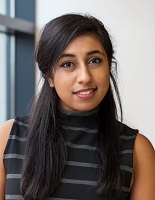
Varsha Eswara Murthy, University College Dublin (Ireland)
Student SIG Co-Chair and ACBS Board of Directors Student Representative
Varsha Eswara Murthy is a doctoral research student in University College Dublin (UCD). Varsha completed her undergraduate and master’s degrees at UCD, graduating top of her Masters of Psychological Science class. Varsha’s thesis focuses on developing and evaluating CBS interventions for marginalised populations, specifically those experiencing homelessness. With rising rates of homelessness and the resulting human suffering, the development of practicable and empirically validated interventions with a strong theoretical basis that will serve this population has been a goal of hers for some time. Alongside researching the development and efficacy of ACT interventions, Varsha has a background in basic science research and translating this research into applied contexts. She has published research in the area. Varsha has been a member of ACBS since 2015 and has presented her research at international conferences. Varsha hopes to continue researching and developing empirically supported CBS interventions for marginalised populations and the general public.
I am passionate about science communication, researching and translating basic science into applied practices. I will explore different avenues where students can highlight their research and get excited about basic science and its applications. I will put more robust formal supports in place that encourage members to communicate research within their communities, in academic and public contexts. My goal is to build supports for student members to collaborate on innovative research and to provide training by experts in the association. Working with marginalised populations, I am sensitive to the need to create safe and welcoming environments to people from diverse backgrounds. I will find new avenues to enhance the continued growth of a diverse student membership. I am confident that I can bring your ideas and concerns to the board, in order to enhance student involvement and help foster the development of the next generation of clinicians and scientists.

